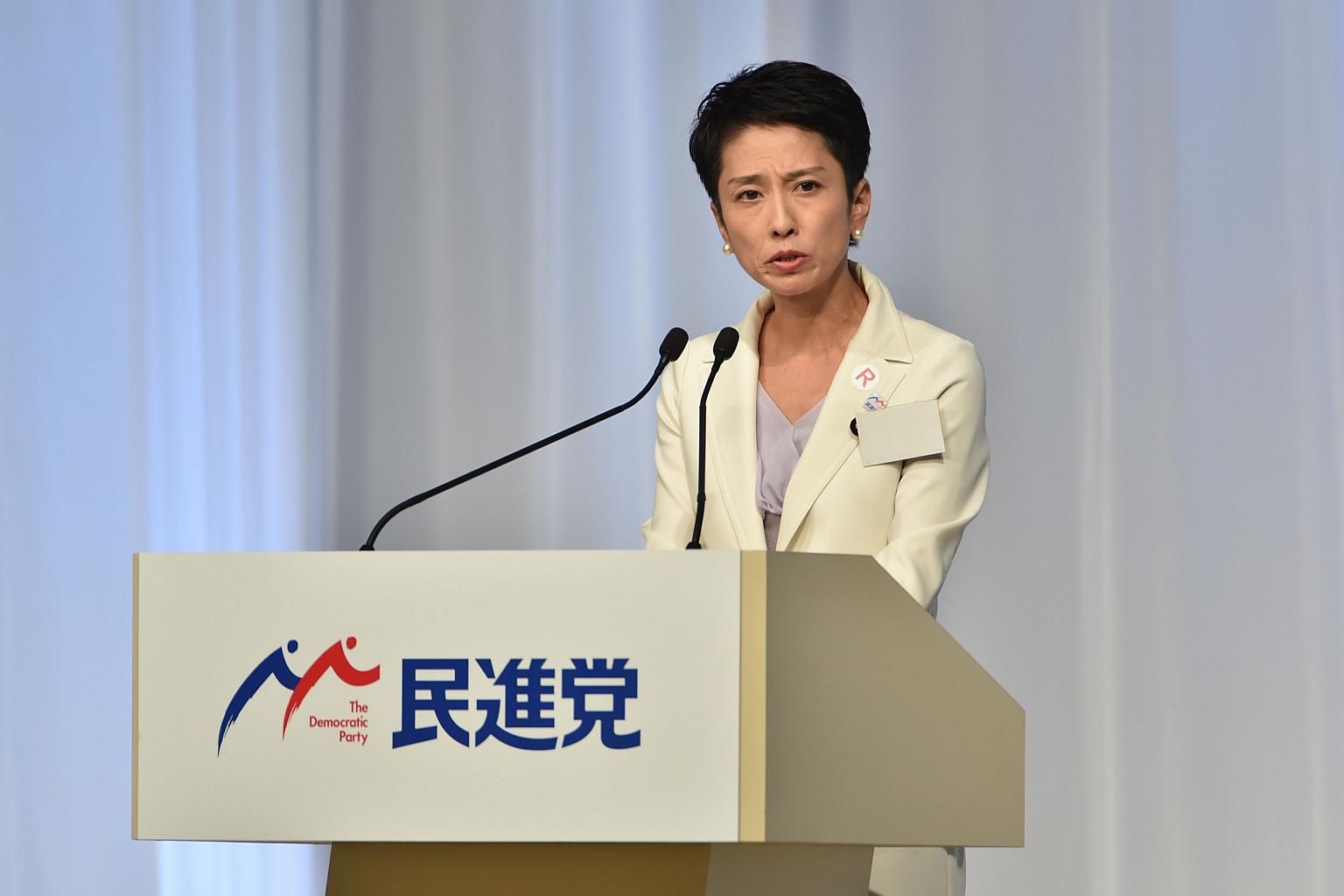5 things to know about Japan's newly elected opposition Democratic Party leader Renho
Sign up now: Get insights on Asia's fast-moving developments

Renho delivers a speech following the Democratic Party's leadership election in Tokyo on Sept 15, 2016.
PHOTO: AFP
Follow topic:
TOKYO - Japan's opposition Democratic Party made history on Thursday (Sept 15), electing a half-Taiwanese former newscaster, Ms Renho, as the first female leader of the party.
Victory in Thursday's party leadership election makes Ms Renho, who goes by only one name, the first woman to lead a major Japanese party since the 1990s.
The 48-year-old mother of twins, a member of the upper house of parliament and the party's acting president, beat former foreign minister Seiji Maehara, 54, and Mr Yuichiro Tamaki, 47, a former finance ministry bureaucrat.
Here are some things to know about Ms Renho.
1. Dual nationality controversy
Ms Renho, who goes by only one name, emerged victorious in the election despite a controversy over her dual nationality, which is prohibited in Japan.
Despite being born in Tokyo to a Taiwanese father and a Japanese mother, she was classified a citizen of Taiwan because Japan only granted citizenship to children with Japanese fathers at the time of her birth.
She received Japanese citizenship in 1985, at the age of 17, when the law was changed.
Although she had said early in her campaign that she had renounced her Taiwanese nationality when she obtained Japanese citizenship, she told reporters on Tuesday (Sept 13) that she had recently learned she was still officially on Taiwan citizenship rolls and had asked to be taken off.
Ms Renho also apologised for the mistake."As a politician, I've never acted as anything other than a Japanese person. I've worked for Japan and would like to do so from now on as well. My desire to change the party has not changed."
2. Biracial background makes her a 'radical choice' for Japan
The Japan Times in its report on her victory said her election - coming in spite of her biracial background and the flap over her dual nationality - makes her a "radical choice" in Japan.
Meanwhile, one observer told the South China Morning Post her rising prominence was another example of how "haafu children are very much moving into the mainstream in Japanese society". Haafu is a Japanese term for children born to mixed marriages.
That trend, said Mr Jun Okumura, a visiting scholar at the Meiji Institute for Global Affairs, was different from when he was growing up, "when these children were looked at with curiosity and even disdain because of their assumed circumstances".
Ms Renho is also the latest among a number of biracial Japanese women to have made the headlines in recent years.
On Sept 5, Ms Priyanka Yoshikawa, who is of Indian and Japanese descent, was crowned Miss Japan. Her win came a year after Ms Ariana Miyamoto, who has an African-American father, represented Japan at the Miss Universe beauty pageant.
3. Paving the way for female leaders in Japan
Ms Renho's victory on Thursday means she is the third woman to assume a high-profile political post in Japan in less than two months.
In July, Tokyo elected its first female governor, Ms Yuriko Koike, and last month, Prime Minister Shinzo Abe appointed Japan's second female defence minister, Ms Tomomi Inada. (Ms Koike was the first.) Both are members of Mr Abe's conservative party, the Liberal Democrats.
While her victory is not expected to usher in an era of female dominance in Japan - where women still represent less than 15 per cent of all seats in parliament - it is still regarded as a noteworthy moment.
The appointment of three women in positions that could be stepping-stones to the prime minister's office, is important because Japan is far behind nations like South Korea, Taiwan, Britain and Germany, which have elected female leaders.
4. Revitalising the opposition
Ms Renho now faces the task of repairing the Democratic Party's image, battered by three years in power that were plagued by infighting, policy flip flops and unkept promises that handed Mr Abe's LDP a landslide election win in 2012.
She admitted on Thursday her party faces an uphill battle against the LDP, which together with its junior partner dominates both houses of parliament.
"From here on, we will face a giant ruling party," she said after the vote. "I'd like to call upon everyone to join me in becoming a party that does not criticise but makes proposals... so one day we will become Japan's choice."
According to an Asahi newspaper poll this week, 40 per cent of those surveyed support the LDP against 7 per cent for the Democrats.
5. Former model and TV anchor
Ms Renho has been an upper house lawmaker representing Tokyo since 2004 and also previously served as minister for administrative reform.
According to the South China Morning Post, she had studied law at Aoyama Gakuin University and later became the face of car audio products manufacturer Clarion.
She is also a former swimsuit model and television news announcer.
SOURCE: BLOOMBERG, NEW YORK TIMES, SOUTH CHINA MORNING POST, REUTERS, THE JAPAN NEWS

